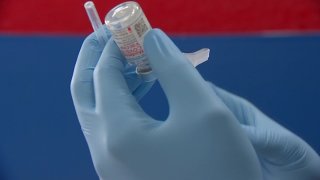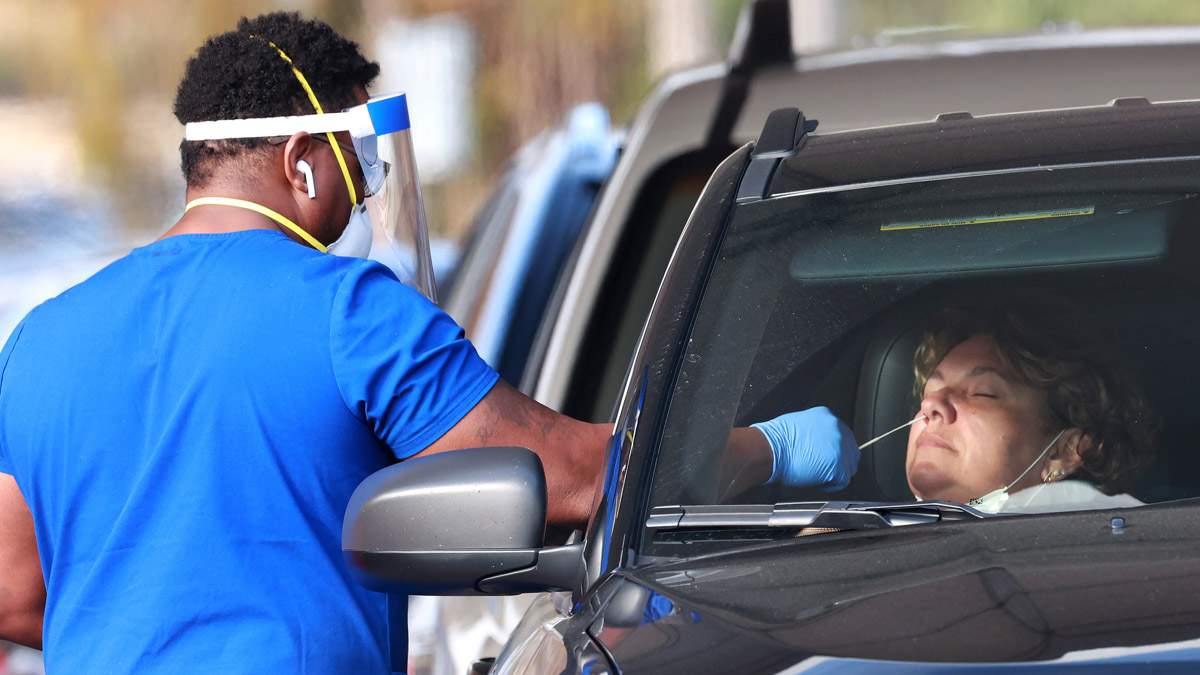
As the numbers of COVID-19 cases and hospitalizations surge, so has demand for the coronavirus vaccine.
According to data from the Texas Department of State Health Services, personnel administered more than 50% more doses of the vaccine last week than they had a month ago.
Statewide, vaccines administered dipped to a post-March low of 314,614 the week of June 28. Last week, 475,131 people got the shot -- an increase of 51%.
Vaccination across North Texas' four largest counties have largely mirrored those statewide. The raw number of vaccinations hit a low point the week of July 12, according to DSHS. But since then, the rate has steadily increased.
Get DFW local news, weather forecasts and entertainment stories to your inbox. Sign up for NBC DFW newsletters.
It's hard to pinpoint what exactly led to the climbing vaccination rate, but it has coincided with the surge of the delta variant, which UT Southwestern says makes up 95% of new COVID-19 in Dallas-Fort Worth, the start of school in many Texas districts and the vaccine mandates put in place by some employers.
COVID-19 Latest
Several healthcare systems in North Texas, including Baylor Scott & White, Texas Health and Parkland, will require employees to be vaccinated by this fall, as will United Airlines, which has a major hub in Houston.
While the state breaks down total shots given by first and second dose and the age range of those receiving them, it's unclear who has received the most recent vaccines because those numbers are not broken down by week.
Collin County saw a 43.5% increase, from 10,570 the week of July 12 to 15,166 the week of Aug. 9.
Dallas County saw the largest increase among the region's four largest counties. The vaccinations jumped 67.6% the week of July 12, from 28,280 to 47,394.
Denton County administered 12,743 shots last week, a 45.3% increase from its summer low of 8,769.
Tarrant County saw a 61.3% increase, administering 21,559 the week of July 12 and 34,771 last week -- significantly down from a high of 129,696 the week of April 5 in a county where 52.2% percent of eligible residents are fully vaccinated -- the lowest percentage among the four counties.
Collin County has the highest percentage of residents 12 and older fully vaccinated at 64.5%. In Dallas County, 54% of those are fully vaccinated, while in Denton County it's 58.7%.
COVID-19 Vaccines
In Texas, the COVID-19 vaccines are currently available to anyone over the age of 5. The vaccines are still not approved for children younger than 5 however -- those trials are ongoing.
Once vaccinated, people who received either the Moderna or Pfizer vaccines are expected to get some level of protection within a couple of weeks after the first shot, but full protection may not happen until a couple of weeks after the second shot. For those who receive the Johnson & Johnson vaccine -- there is only one shot needed.
As of Jan. 3, 2022, it is also recommended those who are age 12 and up and who have been fully vaccinated receive a booster as early as five months after their last dose, for a total of three shots. The vaccine made by Pfizer and its partner BioNTech is the only U.S. option for children of any age.
As for even younger children, kid-size doses for 5- to 11-year-olds rolled out in November and experts said healthy youngsters should be protected after their second dose for a while. But the FDA also said on Jan. 3, 2022, that if children that young have severely weakened immune systems, they will be allowed a third dose 28 days after their second. That’s the same third-dose timing already recommended for immune-compromised teens and adults.
Pfizer and Moderna are studying their vaccines, in even smaller doses, for children younger than 5.
Even when fully vaccinated, it's still possible to become infected by the virus since none of the vaccines offer 100% protection from infection. With that in mind, even if you've been vaccinated it's still a good idea to wear a mask and keep some separation between strangers or those whose vaccination status is unclear.


